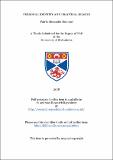Files in this item
Personal identity and practical reason
Item metadata
| dc.contributor.advisor | Hawley, Katherine (Katherine Jane) | |
| dc.contributor.author | Hummel, Patrik Alexander | |
| dc.coverage.spatial | 315 p. | en_US |
| dc.date.accessioned | 2018-12-03T09:47:42Z | |
| dc.date.available | 2018-12-03T09:47:42Z | |
| dc.date.issued | 2018-06-28 | |
| dc.identifier.uri | https://hdl.handle.net/10023/16607 | |
| dc.description.abstract | In this thesis, I argue that the interdependence between personal identity and practical concerns is overstated. In paradigmatic places where philosophers and common sense suggest that personal identity constrains how we should reason and care, or vice versa, the two spheres are in fact neutral to each other. I defend this claim by considering four specific cases. First, a rough characterization of the distinction between the complex and the simple view is that the former takes personal identity to consist in other relations, whereas the latter does not. I argue that the extreme claim according to which the complex view fails to give reasons for future-directed concern can be resisted. We maintain forward-looking attitudes and projects not because someone will be us, but because we relate to future selves in other, more important ways. Second, I argue that intuitions in a range of popular imaginary cases are contaminated by practical concerns whose relevance for personal identity is far from straightforward. Third, I argue that on a closer look, the complex versus simple distinction is confused. It thus cannot be what grounds differences in judgements on what matters. Debates about personal identity should be framed in terms of better understood notions. Finally, I argue that it is not a constraint on rational transformative choice that decision-maker and transforming individual are identical. Moreover, whether we are deciding for ourselves or for others - the importance of informed consent for transformative treatments is not diminished by the decision-maker's failure to projectively imagine the outcomes. | en_US |
| dc.description.sponsorship | "I am grateful for funding from the German Academic Exchange Ser- vice (DAAD) and the Royal Institute of Philosophy as well as a fee waiver from the University of St Andrews. I also thank the University of St Andrews and my supervisors for allowing me to take a leave of absence for an internship with the Global Health Ethics Unit of the World Health Organization (WHO) in Geneva. The internship was support by a Carlo Schmid Fellowship from DAAD." - Acknowledgements | en |
| dc.language.iso | en | en_US |
| dc.publisher | University of St Andrews | |
| dc.relation | Hummel, P. (2017). Against the Complex Versus Simple Distinction". In: Erkenntnis 82.2, pp. 363-378. | en_US |
| dc.subject | Personal identity | en_US |
| dc.subject | Practical reason | en_US |
| dc.subject | Complex view | en_US |
| dc.subject | Simple view | en_US |
| dc.subject | Transformative experience | en_US |
| dc.subject | Self-concern | en_US |
| dc.subject | Psychological continuity theory | en_US |
| dc.subject | Narrative identity | en_US |
| dc.subject | Informed consent | en_US |
| dc.subject.lcc | BF697.H8 | |
| dc.subject.lcc | Identity (Psychology) | en |
| dc.subject.lcc | Personality | en |
| dc.subject.lcc | Practical reason | en |
| dc.title | Personal identity and practical reason | en_US |
| dc.type | Thesis | en_US |
| dc.contributor.sponsor | Deutscher Akademischer Austauschdienst (DAAD) | en_US |
| dc.contributor.sponsor | Royal Institute of Philosophy | en_US |
| dc.contributor.sponsor | St Andrews and Stirling Graduate Programme in Philosophy (SASP) | en_US |
| dc.contributor.sponsor | University of St Andrews. Arché Travel Fund | en_US |
| dc.contributor.sponsor | University of St Andrews | en_US |
| dc.type.qualificationlevel | Doctoral | en_US |
| dc.type.qualificationname | PhD Doctor of Philosophy | en_US |
| dc.publisher.institution | The University of St Andrews | en_US |
| dc.identifier.doi | https://doi.org/10.17630/10023-16607 |
This item appears in the following Collection(s)
Items in the St Andrews Research Repository are protected by copyright, with all rights reserved, unless otherwise indicated.

